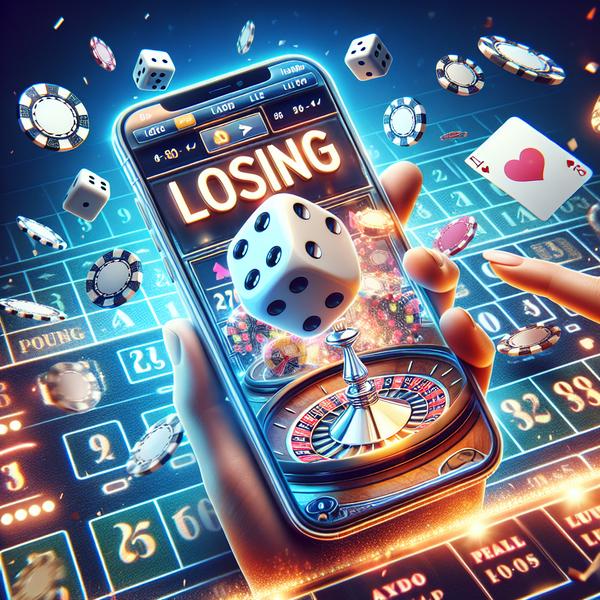The Myth of the 'Hot Streak'
Understanding 'Hot Streak' Myths
Many people who gamble online think they can win lots of games in a row, but that's not how it works. Every game, like slot machines or roulette, is its own chance, not connected to the last game. Even if someone won before, it doesn't mean they'll win again. The mistake of thinking there's a winning streak when there isn't one is called the gambler's fallacy.
Here's a simple list to clear up common misunderstandings about winning streaks in internet betting.
- Myth: Previous wins guarantee future success.
- Reality: Each bet is an independent event, with the same odds as before.
- Myth: A game will turn "hot" after a certain number of losses.
- Reality: The odds do not change based on past losses; each play is random.
People often think if they keep winning, they should bet more because they're on a lucky streak. But really, winning before doesn't mean you'll keep winning. Each time you play, your chances of winning are the same as when you started.
When people win several times in a row, they might start to think they can keep winning and start betting more heavily, feeling excited by their wins. But online gambling uses computer programs to decide who wins, and it's completely random, so there's no way to control it. It's important for players to know this to avoid making decisions that could end up causing them problems.
Psychology Behind Winning Illusions

We naturally look for patterns to understand things. In online betting, this makes people believe that if they keep winning, they will keep on winning. But actually, they just remember their wins more than their losses. The truth is, these games are based on chance, so there's no way to predict winning streaks.
Online gaming platforms are designed to exploit this misconception through their graphic and auditory cues. When players win, bright lights and celebratory sounds create a sensory feedback loop that enhances the perception of success. Here are key features online casinos use to strengthen the illusion:
- Consistent visual stimuli when wins occur, like flashing lights or animated characters celebrating.
- Positive sounds, such as the clinking of coins or triumphant music associated with success.
- Testimonials or display of other players' wins, suggesting that winning is common and potentially imminent.
- Offering bonuses or rewards after a win to encourage further play.
These strategies can make people think they have a better chance of winning and keep gambling, believing they're on a lucky run. It's important to be aware of these tactics and not fall for them. By writing down your wins and losses, you can understand how you're really doing in gambling, rather than just guessing.
Knowing about the tricks our minds play on us is the best way to avoid getting too caught up in online gambling. It's important to learn that these games are random and that what seems like skill or luck is just chance. Understanding this can help us keep gambling for fun and not get carried away, because every play has the same odds of winning or losing as any other.
Statistical Reality of Gambling

When you gamble, it's all about random chance, not luck or how good you are. Each time you spin the wheel or throw the dice, it's a whole new game that doesn't care about what happened before. Casinos have an edge that means they'll end up winning in the long run.
Many players think they can guess or control what will happen when they play games using different plans, but the numbers show that these plans don't really work.
- Independence of events means that past wins do not predict future wins.
- The gambler's fallacy is a misconception that a certain outcome is 'due' after a streak.
- Psychological biases often mislead players into overestimating their chances.
- Each game has a fixed set of probabilities that favor the house.
Slot machines and online games use a system that makes each play random, so past plays don't affect the next one. You can't really control what happens in the game. Also, people check these machines and websites a lot to make sure they are fair, so everyone has an equal chance to win or lose.
The main point to remember is that believing you can predict wins in gambling because you've won a few times is not safe and can lead to bad decisions. It's important for gamblers to know that winning a few times in a row is just chance and not something to count on. Although it's possible to win sometimes, the rules of gambling usually mean that the people running the game will almost always come out ahead in the end.
Our latest online casino reviews (2024)
Recognizing Gambler's Fallacy

Many gamblers wrongly think that if something happens a lot in games of chance, the opposite is about to happen. This mistake is called the Gambler's Fallacy. It's important for gamblers to understand that past outcomes don't affect future ones. For instance, even if a coin lands on heads five times, the next flip still has an equal chance of being heads or tails.
To understand when you're thinking like a gambler in the wrong way, watch for these signs:
- Independence of Events: Remember that events in games of chance, such as roulette spins or dice throws, are independent from one another.
- Unchanged Probabilities: The odds of any single event occurring do not change regardless of past outcomes.
- Flawed Pattern Recognition: Don’t be fooled by seeing patterns where none exist – sequence of outcomes is often random.
- Limited Influence: Player actions have a very limited influence, if any, on the randomness of the game.
When you gamble online, remember that computer programs make sure each game is completely random. So, past wins or losses don't affect your chances. For example, online slot machines use special systems to make sure that every spin is random and not connected to the one before it.
Smart gamblers know that winning is all about luck. They set a money limit and stick to it, making sure not to try to win back what they’ve lost by thinking a win is just around the corner. It’s wise to take breaks and to treat gambling as fun, not as a way to earn cash. Knowing that what happens in past bets doesn't change future outcomes helps players make smart choices and enjoy betting games without being fooled by randomness.
Effects of Consistent Losses

Losing money repeatedly through online gambling isn't just about the money. People who gamble and lose tend to owe more money after each time they bet. This can lead to serious money problems, affecting not only the gambler but also their loved ones. Each time gamblers lose, they want to win back what they've lost, but this often just leads to even more debt.
Winning and losing a lot can really affect a person's feelings and mind. This can cause stress, worry, and for some people, even depression. If someone keeps losing, they may start to feel very bad about themselves and lose hope. Often, no one notices how much this is hurting them until it becomes a serious problem that needs help from a doctor or therapist.
Losing repeatedly can change the way someone acts and makes choices. People who gamble might start to:
- A decreased ability to make rational decisions
- Increased impulsivity
- A distorted view of the odds of winning
- A heightened risk of addiction
As they keep trying to win, their thinking gets worse and they start to wrongly believe that they're about to win just because they've lost many times. This way of thinking makes them gamble even more and gets them stuck in a bad pattern where they keep trying to make up for their losses.
People often think they'll start winning if they just keep betting. This makes them bet more often and with more money, which can make them lose even more. They don't understand that each bet doesn't affect the next one, and just because they've lost before doesn't mean they'll win this time. This wrong belief can cause them to keep losing and not gamble safely.
Strategies for Responsible Gambling

When you gamble online, it's important to know that what happens is completely random. Every time you play a game, like spinning a slot or playing a card, it's not connected to the last time you played. Just because you've been winning a lot doesn't mean it will keep happening. Thinking this way can make you sad and lead to bad habits in gambling.
To gamble responsibly, make sure to set firm boundaries and stick to them. These are straightforward tips to help you do that:
- Set a budget: Decide on a financial limit for each gambling session and stick to it.
- Allocate time: Limit the duration of your gambling sessions to prevent excessive play.
- Never chase losses: Accept losses as part of the game and resist the temptation to recover them.
- Take breaks: Regular intervals help maintain perspective and decision-making clarity.
Knowing that winning streaks don't mean you'll keep winning helps you gamble responsibly. Think of gambling as just for fun, not a way to earn money. This helps you stay realistic and lowers the chance of getting hooked on gambling.
It's important to know when to stop gambling. If you're losing a lot or getting upset, take a break. Remember, gambling should be enjoyable, not stressful or costly. You can use websites that let you block yourself from gambling if you find it hard to stop. To gamble responsibly, have fun but keep control of what you're doing.
Our latest online gambling guides (2024)
Latest reviews of online casinos (2024)
Share this article











When you gamble online, it's important to decide how much money you're willing to spend beforehand. This helps stop you from spending too much and getting into money problems. If you don't do this, you might end up really wishing you had.
A good tip is to avoid trying to win back money you've lost. Accepting losses helps you make better financial choices and avoid rash decisions.